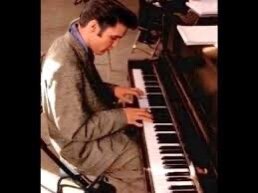I hadn’t opened The Women Who Loved Elvis All Their Lives in a long time. I don’t think I was ever, in those poems, trying to see into a past time, a man, an icon, so much as I was playing around in my head with the entire nature of art, of poetry, of music. By “nature of,” I guess I mean, why did humans ever want to paint animals on the walls of caves, why do we sing and write and paint? You can’t eat art. You can’t wrap yourself in it to keep warm.
Here’s one poem from the book. It’s the one that Bob Chelmick first ran across when he was collecting material for his radio show. (Read Wobbly # 181).
Here I am, in 2008, reading “Gospel.” https://www.poetryfoundation.org/podcasts/75015/gospel
Here’ s the poem on paper:
Elvis Sings Gospel
The picture of Elvis late at night at the piano,
singing gospel. Everyone has left. There are a few
folding chairs and the upright piano. Elvis
is lifting almost out of his black-and-white shoes;
there’s no music to look at. It’s so simple, the way
loneliness sits down in the middle of a bare room
and the middle gives way, and here you are, in the real
music that meant itself to be played. He is leaning
to the keys, bringing them to whatever the point was—
the typical point of getting washed in the blood of the Lamb,
or building a sure foundation, or going home
to the Lord—but he is hearing the words as exactly themselves,
individual, no reference to anything. I am not
imagining this. I know it: the way the words
save you by themselves, the hush of the word’s entrance
like a spirit-lamp. Nobody wants anything
more than they want home—what home means—
struck like a gong against itself, reverberating
Gladys, maybe, or Uncle Vester, the Assembly of God
Church, Mississippi Slim, Big Mama Thornton,
Ernest Tubb, all the way out to the barely audible
crowds, the great weariness to come. But inside
is the word, encouraged slightly into music, taking
the shape of the room until neither one exists
anymore, doesn’t have to, since it is home already.
Elvis cut his teeth on gospel. He loved it much more than Rock & Roll. So I was seeing him there, alone, reverting to what he loved best. I’m using lines from hymns I remember. But what I’m knowing, and what pours into the poem, is that, by this time for him, the words have pulled themselves loose from their associations. He was loving the words themselves.
You learn to love the words themselves. You can sing and not care a whit what the implications are. Think of Christmas carols. Do we think about the lyrics of “God rest ye merry, Gentlemen”? What made me wake up this morning with these words in my head: “An old, mad, blind, despised and dying king”? (It’s Shelley. Look it up). It was the words only, the sound of them (not even politics, I think) that came to me.
When I wrote, “the words / save you by themselves / the hush of the word’s entrance / like a spirit lamp,” I think I was feeling how—to use a poem I love as an example—when I say to myself the beginning of Gerard Manley Hopkins’ poem,
I caught this morning morning’s minion, king-
dom of daylight’s dauphin, dapple-dawn-drawn Falcon, in his riding
Of the rolling level underneath him steady air, and striding . . .
the words may vaguely pull up an image, and may pull up the whole poem for me, but most of all, they’re pure language, pure singing. This kind of singing is like a struck gong. It is home, really, in that it has lodged deep in the heart. It carries the flavor, maybe, of the first time we heard it. It carries the flavor of all that’s been added to it since then.
But it is utterly solitary. It is our private love affair. It is, after all, what we wrap ourselves in to keep warm. It’s what we sing in the car when we’re alone. it brings us back to ourselves in some way we can’t say.


